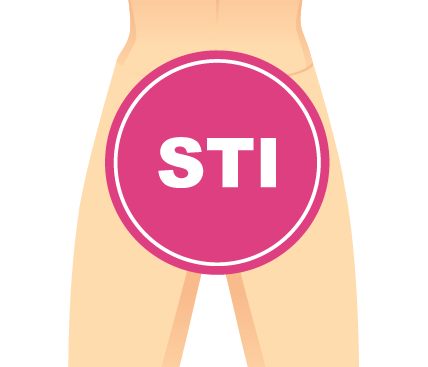STI

Sexually Transmitted Infections, or STIs for short, are infections you can get by engaging in sexual contact, whether that be sexual touching or penetration. They are passed on through bodily fluids and skin-to-skin contact. In order to get an STI, the person you are having sex with must already have an STI but remember they might not know they have one.
Sexually Transmitted Infections can be categorised into three different types, virus, bacteria and parasitical.
You can find out more about Sexually Transmitted infections here (link to what we test for)
If you have STI symptoms, think you were exposed to an STI, you feel like you might have one but aren’t sure, or it’s just been a while since you last got tested, here’s your to-do list
You can make an appointment by calling 01744 646 473 link to clinic
Knowing when to test is important, testing too early after sexual contact can mean you may miss an infection. Some infections do not show up immediately after sex and you may need to wait to get accurate test results.
We usually say to wait:
If you have symptoms of infection, contact us for a telephone appointment; we will offer testing sooner.
Symptoms can vary but may include:
Booking a test is easy! Just give us a call 01744 646 473. When you call, reception will ask a series of questions, they do this to make sure you get the right appointment. To find out more about clinic visit our clinics page link
If you are attending for a sexual health screen for possible infections then we will ask for a urine sample, a blood sample, a vaginal sample, oral and/ or anal swab dependent on the type of sex you have. You may be asked not to go for a wee for up to one hour before your appointment.
Remember, you are in control of the situation and only samples you consent to give, will be taken.
Please make sure you are hydrated (had plenty of water to drink) and have eaten before your appointment, just in case we need to take a blood sample.
Below are some the infections we might test you for. Click on a link for more information about that infection, how it is diagnosed and treated. These links go to either the NHS website or the British Association for Sexual Health and HIV (BASHH) website.
There are also STIs which cannot be ‘tested for’, but that we can diagnose by examining you:
No, they are taken using a cotton bud and while this might be a bit uncomfortable, but they are not painful.
Having a fear of needles is nothing to be ashamed of and there are some simple things that you can do to help overcome it.
If your fear is preventing you from having a blood test, speak to the nurse or doctor.
You will receive a text message from us when your results are back. Results take up to two weeks to be returned so please wait at least two weeks after your appointment or after sending your self-test kit sample back before contacting us.
Please make sure you tell us if you have changed your mobile number when you attend - we will also ask you to confirm your details when you attend - as we rely on this to get in touch with you.
Finding out you have a sexually transmitted infection (and that you may have passed it to other people) is not anyone’s idea of fun. But try to remember that a lot of people have been through this. STIs are very common, and most of us will get at least one over the course of our lives. Take a breath, you can handle this.
Making a safer sex plan can help avoid sexually transmitted infections, this can include using protection such as condoms and dams, you can order condoms for free from (insert link) getting tested regularly and communicating honestly with partners to lower your chances that you’ll have to deal with this stuff in the future.